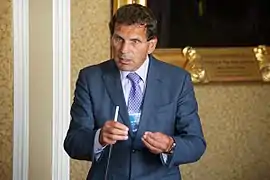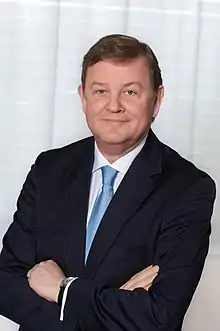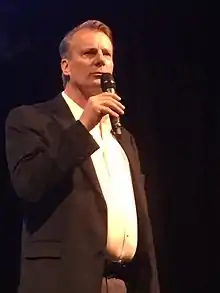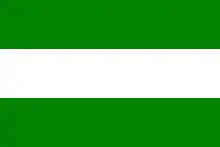Erasmus University Rotterdam
Erasmus University Rotterdam (abbreviated as EUR, Dutch: Erasmus Universiteit Rotterdam [eːˌrɑsmʏs ynivɛrsiˌtɛit rɔtərˈdɑm]) is a public university located in Rotterdam, Netherlands. The university is named after Desiderius Erasmus Roterodamus, a 15th-century humanist and theologian.
Erasmus Universiteit Rotterdam | |
.png.webp) | |
| Latin: Academia Erasmiana Roterodamensis | |
Motto in English | Making Minds Matter[1] |
|---|---|
| Type | Public, General |
| Established | 1913 |
| Endowment | €588 million[2] |
| Rector | Professor Dr. Rutger Engels |
Academic staff | 3.398[3] |
| Students | 29,499[3] |
| Location | , |
| Colours | Erasmus Green & Bright Green[4][5] |
| Affiliations | AMBA EQUIS AACSB |
| Website | www.eur.nl |
Erasmus MC is the largest and one of the foremost academic medical centers and trauma centers in the Netherlands, whereas its economics and business school, Erasmus School of Economics and Rotterdam School of Management are well known in Europe and beyond. Currently, Erasmus University Rotterdam has been placed in the top 100 universities in the world by four major ranking tables.[6][7][8][9] In 2017, the university was ranked by Times Higher Education as 69th in the world[10] with its business & economics as 17th,[11] and clinical health as 42nd[12] in the world, and was ranked among top ten business schools in Europe by the Financial Times.[13] In 2015, Erasmus University Rotterdam was ranked by Times Higher Education as 20th in Europe and 72nd in the world, with its social sciences as 40th, and clinical health as 35th in the world.[14][15]
The university has seven faculties and focuses on the following four areas:
- Health – Faculty of Medicine and Health Sciences/Erasmus MC and Erasmus School of Health Policy & Management (ESHPM)
- Wealth – Erasmus School of Economics and Rotterdam School of Management
- Governance – Erasmus School of Law and Erasmus School of Social and Behavioural Sciences (ESSB)
- Culture – Erasmus School of History, Culture and Communication, Erasmus School of Social and Behavioural Sciences (ESSB) and Erasmus School of Philosophy (ESPhil)
History
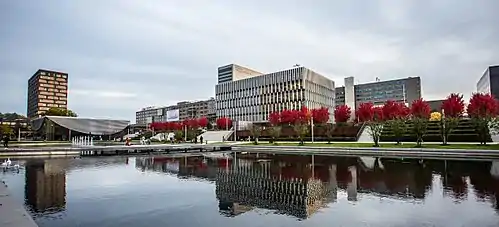
Erasmus University Rotterdam was founded on 8 November 1913 as the Netherlands School of Commerce (Nederlandsche Handels-Hoogeschool, or NHH) through private initiative with broad support from the business community of Rotterdam.[16] In 1937, the school was recognized as a higher educational institute with university status, providing education in commerce and economics as an academic discipline. This resulted in a change of its name: the NHH became the NEH, or Netherlands School of Economics (Nederlandse Economische Hogeschool). The growing complexity of society led in the 1960s to the arrival of the faculties of Law and Social Sciences, followed in later decades by Philosophy, History and Arts, and Business Administration.
From 1950, the Foundation for Higher Clinical Education used its best efforts to get a full academic medical study programme established in Rotterdam, and with success: In 1966, the government established the Medical Faculty Rotterdam, housed next to Dijkzigt Hospital. Together with the Sophia Children's Hospital and the Daniel den Hoed Clinic, it forms the University Hospital Rotterdam, which as of 1 January 2003 bears the name Erasmus MC. In 1973, the Medical Faculty Rotterdam and the Netherlands School of Economics merged, after which the institution was renamed under its current name Erasmus University Rotterdam – the first university in the Netherlands named after a person, a man to whom Rotterdam owes the reputation it has held for centuries in the academic world.[17]
Health
This domain includes the Erasmus MC, the Erasmus School of Health Policy and Management (ESHPM) and the Institute for Medical Technology Assessment (iMTA).
Erasmus MC is the new name for the university medical centre in Rotterdam, which is a merger of the Faculty of Medicine and Health Sciences and the University Hospital Rotterdam (Dijkzigt, Sophia, Daniel den Hoed clinic). The biomedical cluster plays a leading role in the field of analysis of role of individual genes playing role in diseases. The Forensic Molecular Biology department works together with the Netherlands Forensic Institute (NFI). Major long-term genetic epidemiological studies among the elderly and children are Erasmus Rotterdam Health for the Elderly (ERGO) and Generation R respectively. The Erasmus School of Health Policy and Management (ESHPM) forms a bridge between medicine and the health sciences on the one hand and social sciences on the other. The institute for Medical Technology Assessment (iMTA) conducts health economic research in collaboration with both the Erasmus MC and the Erasmus School of Health Policy and Management.
Wealth
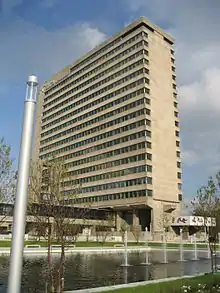
This area includes the Erasmus School of Economics and the Rotterdam School of Management. Its economics programmes and management programmes attract students and postgraduates from all over the world. The research schools Erasmus Institute for Management (ERIM) and the Tinbergen Institute attract PhD students, research fellows, PostDocs and visiting professors of repute from all corners of the world. Other joint ventures are the English-language programme International Business Administration, the Erasmus Executive Development programme (EED) and the Erasmus University Centre for Contract Research and Business Support (ERBS).

Governance
The research focuses on the organisation of business and society. This area has ground in common not only with economics and management, but also with medicine and health sciences.
Culture
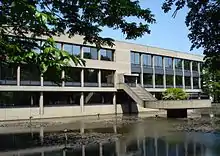
As one of four concentrations of Erasmus University, culture is defined broadly with focus on the areas of media, cultural economics, and the high arts. Primary research is on society and the arts, including cultural policy, media, and social identity in modern society. Faculty has particular strengths in research, and the students tend to graduate with strong research skills for both academic and field placement.
Research Institutes/Schools
Wealth
- Erasmus Research Institute of Management
The Erasmus Research Institute of Management (ERIM) is the joint research institute of the Rotterdam School of Management and the Erasmus School of Economics, both at Erasmus University Rotterdam. It aims to bring together top researchers in business and management.
- Econometric Institute
Erasmus University today is seen as the leading university in Econometrics and Operational Research. Jan Tinbergen, Nobel Prize winner for Economics (1969), and Henri Theil founded the Econometric Institute and influenced both Econometrics & Management Science. Tinbergen's theories also had a political inclination, with multiple objectives of price stability and employment and policies to achieve the desired results and stabilizing the economy.
- Tinbergen Institute (TI)
The Tinbergen Institute is a joint institute for research and education in economics, econometrics and finance of the University of Amsterdam, the VU University Amsterdam and the Erasmus University Rotterdam. It is one of the top research institutes and graduate schools in economics and finance in the world.[18] It offers a research master program (MPhil) in economics and finance as well as PhD opportunities.
- Transport, Infrastructure and Logistics (TRAIL)
In association with TU Delft, the TRAIL Research School is the Dutch national research school active in the fields of Transport, Infrastructure, and Logistics.
- Erasmus Centre for Entrepreneurship (ECE)
Health
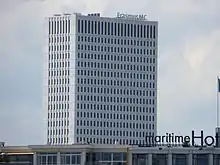

- Cardiovascular Research School Erasmus University Rotterdam (COEUR)
- Netherlands Institute for Health Sciences (NIHES)
- Postgraduate School Molecular Medicine (MM)
- Medical Genetics Centre South-West Netherlands (MGC)
MGC participates in the top Research School Centre for Developmental and Biomedical Genetics
- Helmholtz School for Autonomous Systems Research
Law, Culture and Society
- Institute for Sales and Account Management
- International Institute of Social Studies
- Research School Public Safety
- Netherlands Institute of Government (NIG)
- Huizinga Instituut
- N.W. Posthumus Instituut
- Amsterdam School of Social-Public Research (ASSR)
- Research School Rights of the human
- Experimental Psychologic Researchschool (EPOS)
- Kurt Lewin Institute
- Research School of Ethics
Campus
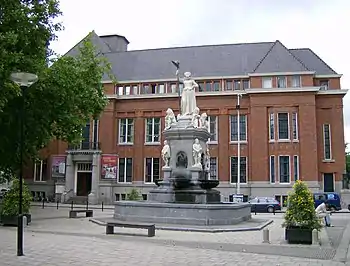
.jpg.webp)
The University has campuses at five locations, of which four in Rotterdam and one in The Hague:[19]
- Campus Woudestein (main university location near Rotterdam-Kralingen)
- Campus Hoboken (Erasmus MC location near Rotterdam-Dijkzigt)
- Location EUC (Erasmus University College in Rotterdam Center)
- Location ISS (International Institute of Social Studies located in The Hague Center)
- Location ECE (Erasmus Centre for Entrepreneurship near Rotterdam-Delfshaven)
Sustainability
On 9 September 2009 ("Sustainability Day"), GreenEUR was launched officially. During this day, GreenEUR organized several on-campus activities in cooperation with Greening the Campus. Since April 2010 GreenEUR is officially recognized by the Executive Board.[20]
Student activities
- In Duplo - Student Association for double degree students
- Economic Faculty Association Rotterdam
- STAR Student Association Rotterdam School of Management
- FAECTOR – official school association Erasmus School of Economics
- Econometric Career Days
- Erasmus debating society – oldest debating society in the Netherlands [21]
- Erasmus Centre for Entrepreneurship
- Erasmus Magazine
- EUCSA – Student Association EUC Campus, Liberal Arts & Sciences
Rankings
| University rankings | |
|---|---|
| Global – Overall | |
| ARWU World[7] | 80 (2020) |
| CWUR World[9] | 68 (2020-21) |
| QS World[22] | =197 (2021) |
| THE World[6] | 72 (2021) |
| USNWR Global[8] | =68 (2021) |
| Global – Business and economics | |
| Financial Times MBA[23] | 66 (2020) |
| QS MBA[24] | 29 (2021) |
| THE Business and Economics[25] | 25 (2021) |
| Global – Life sciences and medicine | |
| QS Life Sciences & Medicine[26] | =54 (2020) |
| THE Clinical and Health[27] | 62 (2021) |
Erasmus School of Economics
- Economics Department
The economics faculty is, according to the QS World University Rankings 2018, the 9th best in Europe (UK included) and 50th in the world in economics and econometrics,[28] and 37th in the world in accounting and finance (10th best in Europe).[29] [30]
Times Higher Education World University Rankings ranks Erasmus University 1st in the Netherlands, 7th in Europe and 28th in the world for the subject Economics and Business in 2020.[31]
The Shanghai Jiao Tong University Academic Ranking of World Universities published in 2018, lists Erasmus School of Economics as 9th in Europe and 32nd in the world in the fields of economics and business.[32]
According to US News[33] 2020, Erasmus University Rotterdam ranked 1st in The Netherlands, 2nd in Europe and 13th in the world for Economics and Business.
Rotterdam School of Management
The Financial Times European Business School Rankings [34] as well as the Global MBA rankings [35] consistently lists RSM as top 10 in Europe. The Financial Times ranked the CEMS MSc in International Management offered by Rotterdam School of Management, Erasmus University as sixth in the world in 2019.[36]
- Accreditations
The business school has achieved triple accreditation from the international accrediting bodies of management education; AMBA, EQUIS, and AACSB. Only a 40 business schools in the world have acquired triple accreditation, although many schools have a policy of not applying for multiple accreditations.
Erasmus Medical Center

The Erasmus MC (university medical center) is considered by several major rankings to be a global top institution for clinical medicine, i.e. ranked in the world as 45th in 2020 by Times Higher Education World University Rankings,[37] as 28th in 2020 by U.S. News & World Report Best Colleges Ranking[38] and 50th in 2019 by QS World University Rankings.[39]
Furthermore, the Erasmus MC is listed by The Scientist as the fifth-best of the top 15 medical institutions outside the United States (ranking 2004).
Education
Undergraduate programmes
Erasmus University Rotterdam offers a broad range of Bachelor's programmes taught in the Dutch language, leading to a B.A., BSc or LL.B. degree
Furthermore, the university offers several completely English-language Bachelor programmes. These programmes are open to students aiming for an international career in Business and/or Economics or Communication and Media. Apart from the Dutch students, about 40% of the students taking these programmes are international students from over 80 countries.
Graduate Studies
Students can choose from different types of Master programmes: (common) Master programmes, Research Master programmes or Post-experience Master programmes. Education at this level is given mostly in English.
Research Master’s programmes
Talented graduates are given the opportunity to utilise their skills and potential in academic research. To be eligible for a Research Master, a bachelor's or master's degree must have been obtained.
Post-experience and professional Master's programmes
The university also offers specialised knowledge and skills programmes for further development of one's professional career. These types of programmes leads to the commonly known M.A. or MSc, but also to professional master's degree's like MBA, MFM (Master in Financial Management), or MHM:
Research doctorates
In addition, most departments, affiliated (research) institutes or faculties offer doctorate programs or positions, leading to the 'Doctor of Philosophy' (PhD) degree. Most of the PhD programs offered by the university are concentrated in several research schools or institutes.
Erasmus Honours Academy
Erasmus University offers special honours programmes.
Students are invited to take part if their first-year grades are well above average and if they have proved themselves to be sufficiently motivated. The programmes are either disciplinary: special programmes for the very best students of one departments, or interdisciplinary: one of the Erasmus Honours Programme-tracks, where the very best students of the different faculties of the Erasmus University investigate, discuss, and tackle crucial contemporary scientific and societal questions from various perspectives.
After successfully completing the honours-programme, students receive a Honours-certificate and a Letter of Recommendation from the dean of their respective Faculty, or the Rector Magnificus of the EUR.[15]
Notable staff
Nobel laureate
- Jan Tinbergen (inaugural recipient of Nobel Prize for Economics in 1969)
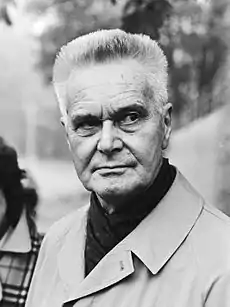
Politics
- Jan Peter Balkenende (former Prime Minister of the Netherlands)
- Pim Fortuyn (politician)
- Alexander Rinnooy Kan (former president of the Dutch Social-Economic Council)
- Jo Ritzen (former Dutch Minister of Education, Culture and Science; alumnus as well)
- Cees Veerman (former Dutch Minister of Agriculture, Nature and Food Quality)
Business
- Hans Wijers (former CEO of AkzoNobel; former Dutch Minister of Economic Affairs)
Scientists
- Eelco van Asperen (computer scientist)
- Klaas Bom (medical engineer and inventor of the portable ultrasound scanner)
- Frank Grosveld (molecular biologist, recipient of Spinoza Prize in 1995)
- Jan Hoeijmakers (molecular biologist, recipient of Spinoza Prize in 1998)
- Albert Osterhaus (virologist and influenza expert; head of the National Influenza Centre, and head of the world reference center for measles of the World Health Organization)
- Gerrit van Poelje (founder of the Public Administration in the Netherlands)
- Henri Theil (successor of Jan Tinbergen; together with Jan Tinbergen founder of the Econometric Institute in 1956)
Philosophy
- Luce Irigaray (feminist theorist)
Notable alumni
Business Studies
- Cor Herkströter (former chairman Royal Dutch Shell, President Commissioner of the ING Group)
- Herman Heinsbroek (former Minister of Economic Affairs; founder, Arcade Records)
- Maarten Fontein (former CEO, AFC Ajax)
Economics
- Frans Muller (CEO, Delhaize Group)
- Jan Tinbergen (first winner of the Nobel Memorial Prize in Economic Sciences)
- Cor Herkströter (chairman of DSM, former chairman of Royal Dutch Shell)
- Eduard Bomhoff (former Dutch Minister of Health, Welfare and Sport and Deputy Prime Minister)
- Prince Johan-Friso of Orange-Nassau (2nd son of Queen Beatrix of the Netherlands)
- Peter Nijkamp (professor of regional economics, recipient of the Spinoza Prize in 1996)
- Jeroen van der Veer (Chairman of Philips, former CEO of Royal Dutch Shell)
- Onno Ruding (former vice-chairman, Citibank; former board member, ABN AMRO; former Minister of Finance in the Netherlands; former executive director of the IMF)
- Frans Weisglas (former president of the House of Representatives of the Netherlands)
- Jan Kees de Jager (former Dutch Minister of Finance)
- Henri Termeer (president, CEO and chairman of Genzyme)
- Trevin Stratton (chief economist at Canadian Chamber of Commerce)
- Albert Winsemius (long-time economic advisor to Singapore)
- Antoine van Agtmael (former economist of the World Bank; coined the term emerging markets)
- Jan Pronk (former Minister for Development Cooperation and Minister of Housing, Spatial Planning and the Environment)
- Cees Veerman (former Minister of Agriculture, Nature and Food Quality)
- Drs. P (singer and writer)
- Frank Slootman (tech billionaire, CEO, Snowflake Inc., former CEO of ServiceNow)
Politics
- Ruud Lubbers (former Dutch Prime Minister and UN High Commissioner)
- Jan Pronk (former Dutch minister and UN Special Representative)
- Supachai Panitchpakdi (WTO Director-General, 2002–2005)
- Johan Witteveen (managing director IMF, 1973–1978 and first chairman of the Group of Thirty)
- Mohammad Hatta (a proclamator of Indonesia's independence, 1st vice-president and prime minister of the Republic of Indonesia)
- Neelie Kroes (former European Commissioner)
- Meles Zenawi (prime minister of the Federal Democratic Republic of Ethiopia)
- Zoran Jolevski (former Macedonian Ambassador to the United States and negotiator of Macedonia naming dispute)
- Paul Zimmerman (councillor, Hong Kong's Southern District Council)
- Melanie Schultz van Haegen (former Minister of Infrastructure and the Environment)
Law
- Stefan Aartsen (former Dutch butterfly swimmer)
- Aart Jan de Geus (former deputy secretary-general of the OECD and former Minister of Social Affairs and Employment of the Netherlands)
- Marianne Thieme (well known Dutch animal activist and politician)
- Fatima Moreira de Melo (former Dutch field hockey international)
Science
- Jacques Cohen (embryologist, director at reprogenetics)
Other
- Lilianne Ploumen (former minister for Foreign Trade and Development Cooperation 2012–2017; member House of Representatives; studied social history)
- Ronald van Raak (member House of Representatives of the Netherlands and non-fiction writer; studied social history and philosophy)
- Maria Lynn Ehren (Miss Universe Thailand 2017)
References
- – website of the EUR
- "EUR Annual report 2016" (PDF).
- "EUR Annual report 2019".
- RAL names of university colors: RAL 6012 – Black Green & RAL 6024 – Traffic Green
- Corporate colours – website of the EUR
- "World University Rankings 2021". Times Higher Education (THE). Retrieved 17 October 2020.
- "Academic Ranking of World Universities 2020". Shanghai Ranking Consultancy. Retrieved 17 October 2020.
- "Best Global Universities – Erasmus University Rotterdam". U.S. News Education (USNWR). Retrieved 11 January 2020.
- "World University Rankings 2020-2021". Center for World University Rankingsg. Retrieved 20 December 2020.
- https://www.timeshighereducation.com/world-university-rankings/2017/world-ranking#!/page/2/length/25/sort_by/rank/sort_order/asc/cols/stats
- https://www.timeshighereducation.com/world-university-rankings/2017/subject-ranking/business-and-economics#!/page/0/length/25/sort_by/rank/sort_order/asc/cols/stats
- https://www.timeshighereducation.com/world-university-rankings/2017/subject-ranking/clinical-pre-clinical-health#!/page/1/length/25/sort_by/rank/sort_order/asc/cols/stats
- "Business school rankings from the Financial Times – FT.com". Financial Times. Retrieved 4 December 2017.
- Times Higher Education University Rankings 2014–2015. Retrieved 22 January 2015
- "EUR Strategy", EUR, nd, retrieved 11 July 2012
- History Erasmus University Rotterdam – website Erasmus Trustfonds
- "History". eur.nl. 14 June 2017.
- See also Ranking Tinbergen (Econometric) Institute
- EUR Locations – website of the Erasmus University Rotterdam
- "GreenEUR". GreenEUR.
- "Welcome". EDS.
- "QS World University Rankings 2021". Quacquarelli Symonds Ltd. Retrieved 17 October 2020.
- "Rotterdam School of Management, Erasmus University - Global MBA ranking 2020". Financial Times. Retrieved 8 January 2021.
- "QS World University Rankings: Global MBA Rankings 2021". Top Universities. Retrieved 8 January 2021.
- "THE World University Rankings 2021 by subject: business and economics". Times Higher Education. Retrieved 8 January 2021.
- "QS World University Rankings by Subject 2020: Life Sciences and Medicine". Top Universities. Retrieved 8 January 2021.
- "THE World University Rankings 2021 by subject: clinical and health". Top Universities. Retrieved 8 January 2021.
- QS World University Rankings economics econometrics 2014. Retrieved 20 June 2014
- QS World University Rankings accounting 2014. Retrieved 20 June 2014
- QS World University Rankings economics econometrics 2013. Retrieved 18 June 2013
- . Retrieved 6 August 2020
- "Academic Ranking of World Universities in Economics / Business – 2015 | 2015 Top 200 Universities in Economics / Business | ARWU-SUBJECT 2015". www.shanghairanking.com. Retrieved 27 November 2016.
- Global University Rankings. Retrieved 31 July 2020
- FT European Business school rankings. Retrieved 1 July 2020
- FT Global MBA Rankings. Retrieved 30 September 2010
- "Business school rankings from the Financial Times". Financial Times. Retrieved 1 July 2020.
- World University Rankings 2020 by subject: clinical, pre-clinical and health – website Times Higher Education World University Rankings
- Best Global Universities for Clinical Medicine – website U.S. News & World Report Best Colleges Ranking
- QS World University Rankings by Subject 2019: Life Sciences and Medicine – website QS World University Rankings
External links
| Wikimedia Commons has media related to Erasmus Universiteit Rotterdam. |

.jpg.webp)
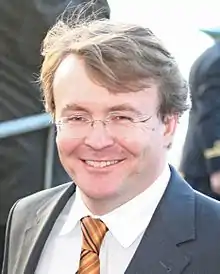
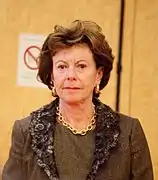
.jpg.webp)
.jpg.webp)
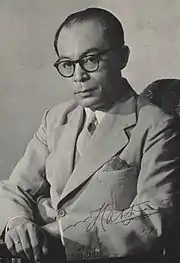
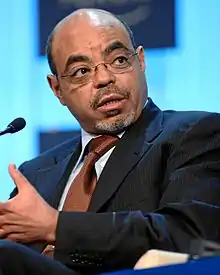
.jpg.webp)
